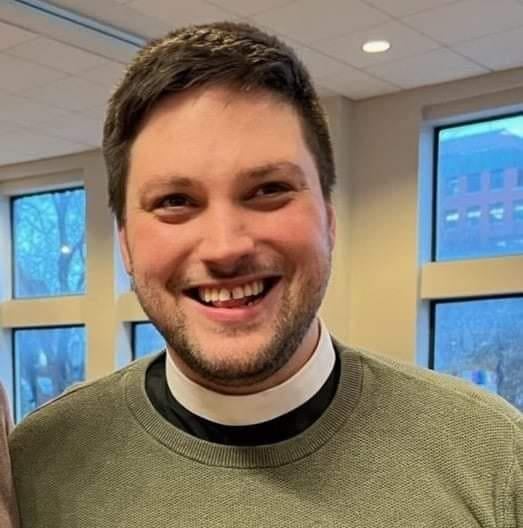The 19th Sunday After Pentecost-Proper 24C
Sunday, October 19, 2025
The Rev. David Wilcox
In the psalm today, we hear the psalmist ask, “I lift up my eyes to the hills; from where is my help to come?”
It’s one of those verses that sounds so familiar and comforting that we might almost miss how honest it really is. The psalmist isn’t looking up at the hills because everything is going great. This is not the voice of someone taking in a scenic view. It’s the voice of someone standing on a long, uncertain road — someone who’s tired, maybe frightened, and not sure what’s waiting beyond the next rise.
That question “From where is my help to come?” is the question of a person who’s run out of options. It’s a prayer that comes out of struggle.
And the thing is, that’s often exactly where faith begins — not in confidence, but in need. Not when everything makes sense, but when we’ve come to the end of ourselves and have nowhere left to look but up.
And that’s where we find Jacob this morning in our reading from Genesis.
Jacob has spent his life trying to stay one step ahead of everyone …his brother Esau, his father Isaac, his uncle Laban. From the moment he was born, grasping at his brother’s heel, he’s been trying to get what he wants through cleverness, persistence, and just a bit of manipulation. He’s not all bad . Jacob is complex, like all of us. He loves his family, he’s faithful in his own way — but he’s also a survivor, someone who believes that the only way to make it in the world is to look out for himself.
But now, after years away, Jacob is heading home. And he gets word that Esau, the brother he tricked and betrayed , is coming to meet him. And not alone. He’s bringing four hundred men.
In Jacob’s mind, that’s not a welcome party; it’s an army. It’s every mistake he’s ever made coming back to meet him on the road.
So he does what he always does: he plans. He sends gifts ahead, divides his household, hopes maybe to soften Esau’s anger with generosity or strategy. But this time, none of it brings peace. He’s out of ideas. He’s done everything he can do — and there’s nothing left but to wait.
So he sends everyone across the river and stays behind. Alone.
And that’s when it happens.
In the darkness, a stranger appears. We don’t know from where. We don’t know why. All we’re told is that Jacob wrestles with him all night long.
It’s one of the most mysterious stories in all of Scripture. We’re never directly told who this stranger is. Is it an angel? Is it God? Is it Jacob’s own conscience, or even his guilt, taking form in the night? Maybe it’s all of those at once.
But whatever’s happening, this encounter changes Jacob forever. By morning, he’s wounded — his hip dislocated, his strength spent — but he’s also blessed. He’s given a new name: Israel, which means “one who strives with God.”
It’s such a powerful image of faith, because sometimes faith really does feel a lot like wrestling.
We wrestle with doubt, with fear, with disappointment. We wrestle with the silence of God, with unanswered prayers, with the gap between what we hope for and what actually happens.
We wrestle with the parts of ourselves we’d rather not see — our impatience, our pride, our weariness.
And like Jacob, sometimes we walk away limping. The encounter with God leaves a mark. But that mark becomes part of our blessing. Because in the struggle, we come to see that God is not standing off at a safe distance. God is there in the dark with us, holding on just as tightly as we are.
That’s what faith looks like — not letting go, even when we don’t understand.
Not giving up, even when we’re tired.
Faith is the decision to keep holding on to God, trusting that God is holding on to us.
That same truth runs right through our psalm.
“I lift up my eyes to the hills; from where is my help to come?”
For people in the ancient world, the hills were both beautiful and dangerous. They were where bandits hid, where wild animals roamed, where the road became unpredictable. The hills represented everything that was uncertain about the journey.
And yet, the psalmist doesn’t stop with the question. He answers it:
“My help comes from the Lord, the maker of heaven and earth.”
Not from the hills.
Not from my own strength.
Not from my plans or cleverness or control.
My help comes from the Lord — the One who made the hills, who sees what’s on the other side, who never sleeps, who never turns away.
It’s a simple confession, but it takes a lifetime to live into. Because most of us are taught to be self-reliant. We like to be capable. We like to fix things, to manage the problem, to feel like we’re in control. We want to believe that if we just work hard enough, plan well enough, pray long enough — we can make life come out right.
But there are moments, and maybe you’ve had one lately, when all of that runs out. When the plan doesn’t work. When the diagnosis comes. When the job ends. When the relationship breaks. When the world feels like too much, when the systems we’ve put our trust in seem to fail.
And in that place… that quiet, uncertain, vulnerable place … faith whispers: Look up.
Lift your eyes.
Not because you’re strong, but because God is.
Not because you understand, but because God does.
In our Gospel reading, Jesus tells a story about someone who does exactly that. A widow — the most powerless figure in her society — goes again and again to a judge, asking for justice. She has no status, no wealth, no influence. But she refuses to give up.
And eventually, the judge gives in — not because he’s compassionate, but because he’s tired of her persistence.
And Jesus says, “If even an unjust judge will listen to that kind of persistence, how much more will your Father in heaven respond to those who cry out to him day and night?”
Prayer, Jesus says, isn’t about wearing God down or convincing God to care. Prayer is about relationship. It’s about keeping our hearts turned toward the One who already loves us. It’s how we stay connected when life feels out of control — how we remember that we’re not alone.
And that’s where Paul’s words to Timothy fit so well today. He tells Timothy to “continue in what you have learned,” to stay rooted in the faith that has carried him this far. Even when others turn away, even when people chase after easier answers, Paul says, “be persistent — whether the time is favorable or unfavorable.” In other words: don’t lose heart. Keep going. Keep trusting. Keep proclaiming the truth.
That’s what the widow does. That’s what Jacob does. That’s what the psalmist does. Each of them keeps looking up, keeps holding on, keeps trusting that God will be faithful.
Because sometimes the only thing that keeps us going is that connection — the quiet assurance that even if we can’t see the outcome, God is still at work. God still hears. God still watches over our going out and our coming in, from this time forth forevermore.
I think all of these readings : Jacob wrestling, the psalmist looking to the hills, Timothy persevering in the face of hardship, and the widow crying out for justice ; are really telling the same story.
Faith doesn’t mean life will be easy.
Faith means we know where to look for help.
It means we turn to the One who meets us in the struggle, who blesses us in our weakness, who listens when we call, who guards our steps on the road ahead.
I’ve always found it striking that the name Israel — the name given to Jacob, and later to God’s people doesn’t mean “the one who has it all figured out.” It doesn’t mean “the one who believes perfectly.” It means “the one who wrestles with God.”
That’s who we are. We are the people who wrestle. We wrestle with our questions, with our calling, with all the obstacles that get in our way. We hold on to God in the dark, even when we’re limping, even when we can’t see the dawn breaking yet.
And still, we look up.
There will be nights when we wrestle, and mornings when we limp. There will be prayers that seem to go unanswered longer than we’d like. There will be hills that look too steep to climb. But through it all, the promise holds true:
Our help comes from the Lord, the maker of heaven and earth.
The God who meets us in the wrestling.
The God who never sleeps or turns away.
The God who, in the end, always keeps faith with us.
So hold on. Keep praying. Keep looking up. And as Paul told Timothy, “proclaim the message; be persistent; encourage, and never lose heart.”
Because your help ,our help, comes from the Lord.
Amen.


